Taliban Close Down Pro-Iran Center In Afghanistan
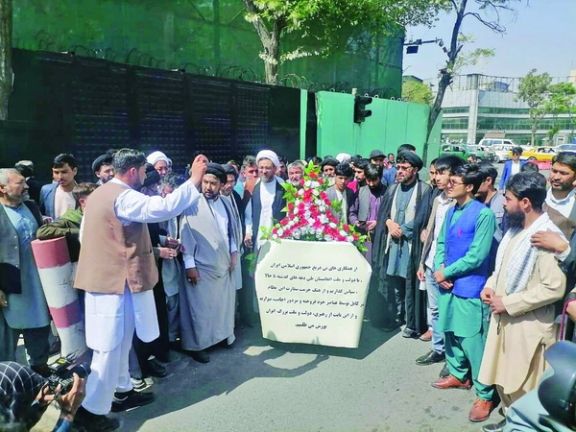
Taliban forces have closed a center with links to Iran that had organized a gathering in front of Tehran’s embassy in Kabul to express support for the Islamic Republic.

Taliban forces have closed a center with links to Iran that had organized a gathering in front of Tehran’s embassy in Kabul to express support for the Islamic Republic.
Tebyan Center for Socio-Cultural Activities, the organizer of the event, said in a statement on Friday that Taliban agents arrested the head of their office Yarmohammad Rahmati on Thursday.
The center held a pro-Iran rally on Wednesday with participants placing flowers on the doors of the embassy building and reading a statement about “solidarity between the brotherly nation of Iran and Afghanistan”.
The Tebyan Center denied reports that the it was shut down completely and said only its activities are restricted without providing details.
There are reports that Taliban has also arrested several people who were connected to the center in Herat.
Protestors Monday attacked the Iranian consulate in Herat hurling stones, smashing security cameras, and burning tires before they were dispersed by Taliban security. Earlier Monday, people also held a demonstration outside Iran’s embassy in Kabul over alleged mistreatment of Afghan immigrants in Iran.
Following the attacks, Iran’s Foreign Ministry said Tehran will not resume its consular services before receiving assurances from Afghan authorities over protection of its diplomatic missions in Afghanistan.
Sectarian tensions have risen since the recent killing of two Shia clerics in Imam Reza shrine, Mashhad, in Iran attributed to Sunni extremists.
The number of Afghan refugees in Iran are increasing after the Taliban takeover last year.
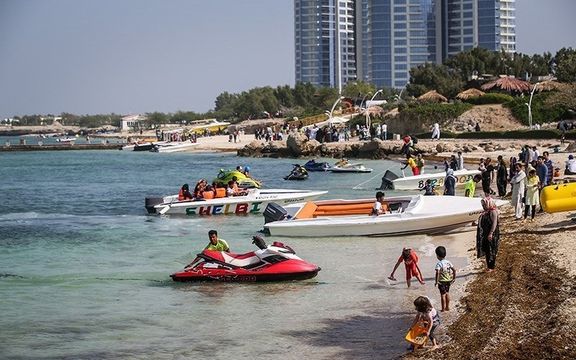
Iran’s embassy in London has accused The Times of London of 'Iranophobia' for mocking Tehran’s offer to host football fans during the World Cup in Qatar.
In a tweet Thursday, the embassy wrote that Iran and its islands in the Persian Gulf were “safe for all including Britons and World Cup fans from around the world to enjoy the beauties of this land,” and that “Iranian civilizational and historical identity cannot be distorted by Times.”
In an article Wednesday headlined "No Room in Qatar? Enjoy the World Cup From An Iranian Island," the Times scoffed at Iran’s readiness to host soccer fans and its considering waiving visa requirements for Kish and other islands.
"Alcohol is banned, British nationals are regularly picked up on spurious charges of spying and only two weeks ago female football fans were pepper-sprayed for having the cheek to attend an international match,” the Times wrote. In Qatar itself, strict laws banning alcohol consumption may be waived during the World Cup for foreigners in hotels if not in stadiums.
Despite an expectation of one million visitors in Doha for the tournament in November and December, booking for hotels has not yet begun. Fans from around the world are looking at options including rooms on a cruise ship at $4,000 a week, private accommodation, and luxury camping in the desert.
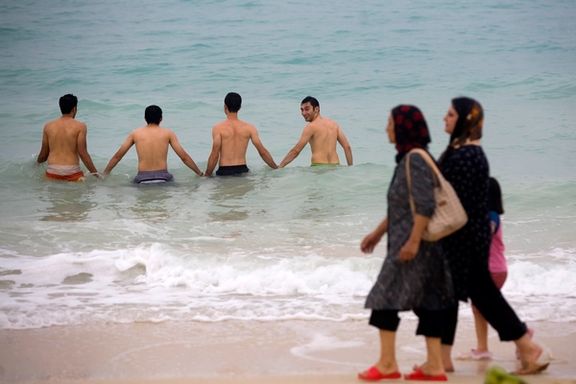
On Sunday, Rostam Ghasemi, Iran's transport minister, met with his Qatari counterpart, Jassim bin Saif Al Sulaiti, on Kish Island to discuss Iran’s involvement, following up suggestions made by President Ebrahim Raisi during a visit to Doha in February.
"Kish is the focal location for these arrangements, although other coastal and non-coastal provinces in Hormozgan and Bushehr close to the Persian Gulf can play a supporting role,” Ghasemi said.
Daily flights
Mohammad Mohammadi, head of Iran’s Civil Aviation Organisation, said the current 72 daily Iran-Qatar flights could be boosted to 100 during the World Cup.
Iran’s tourist sector, which includes religious and medical tourism, has struggled in recent years in the face of both United States sanctions and the Covid-19 pandemic. The sector is keen for a boost from the World Cup and is touting the value on offer in Iran given the rial’s decline on foreign exchange markets. Despite Iran’s ban on alcohol and gender-segregated beaches, it was attracting around 5 million tourists annually before US ‘maximum pressure’ sanctions.
The Times, arguing that easing visa requirement for British and American citizens would not remove a tense political climate between Iran and the west, highlighted cases of dual nationals being arrested in Iran, including the daughter of one protesting this week in London outside the Foreign Office. Tehran and London both denied any connection between Iran recently freeing two British-Iranian dual nationals it had held for years on espionage charges and Britain finally paying a four-decades-old debt of £400 million ($530 million). But the connection between the money and hostages was clear to all for a long time and the exchange happened last month simultaneously.
Some Americans may also remember that Kish Island is where Central Intelligence Agency contractor Robert Levinson disappeared 16 years ago. The Trump administration said Iranian intelligence Iranian was responsible for his capture and probable death.
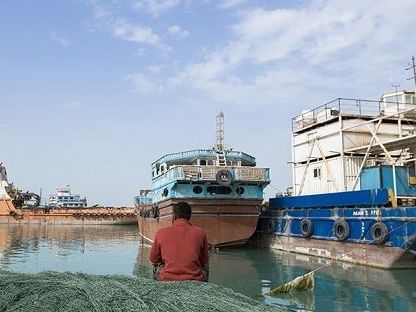
Iran's Revolutionary Guards say they seized two vessels in waters south of Iran, one carrying 250,000 liters of smuggled fuel and another loaded with 130,000 liters.
According to a report by ISNA, one of the vessels was seized in Persian Gulf waters near the Ameri Port in Bushehr province, and the other in Hormozgan province near the Jask Port on the Gulf of Oman on Friday.
Head of the Public Relations Department of the IRGC Navy Colonel Gholam-Hossein Hosseini said that the first ship's seven crew have been detained.
Last week the Guards had seized another vessel carrying 220,000 liters of smuggled fuel in the Persian Gulf and detained its crew of 11.
In recent weeks, IRGC naval units say they have managed to seize a total of 650,000 liters of smuggled fuel from the vessels they seized and handed them over to local judicial authorities.
The sizes of cargos involved indicate these were relatively small vessels transporting oil between local ports. Large tankers carry hundreds of thousands of barrels of oil.
Iran has boarded and seized foreign-flagged tankers in the past. One major incident occurred in January 2021 when the IRGC seized a Korean tanker for what seemed to be Iranian pressure on Seoul to release around $7 billion of funds frozen because of US sanctions.
The US Navy in the Persian Gulf region is known to have intervened in some instances to protect tankers.

A high-ranking official of Iran’s Judiciary says a total of 30 Iranian nationals are imprisoned abroad on charges of circumventing Washington’s sanctions.
Kazem Gharibabadi, a senior Judiciary official and secretary of the Iran’s High Council for Human Rights, added on Friday that government officials are following up on their cases.
He criticized what he called the Western “double standard” approach on the issue of human rights, saying that “the number of Iranians who need human rights protections abroad is not small”.
“There are many examples in this regard, like the sham trial of [former Iranian judicial official] Hamid Nouri in Sweden, the violent mistreatment of a female Iranian asylum seeker by the Danish police in front of her child, and even Iranians being prosecuted under the pretext of circumventing US sanctions against Iran,” Gharibabadi said.
He stressed that “in some cases the follow-up process is lengthy and does not mean that we are abandoning them. We give various forms of human rights support.”
His remarks came as talk of a possible prisoner swap deals between Iran and the United States circulates in media especially since Iran freed British Iranian Nazanin Zaghari-Ratcliffe and Anoosheh Ashoori in exchange for the UK paying a four-decade-old £400m ($522 million) debt to Iran.
Following reports about the release of Iranian funds frozen by third countries in return for Tehran freeing Iranian-Americans it holds hostage, the US State Department denied “any breakthrough” in talks on the release of four US citizens.
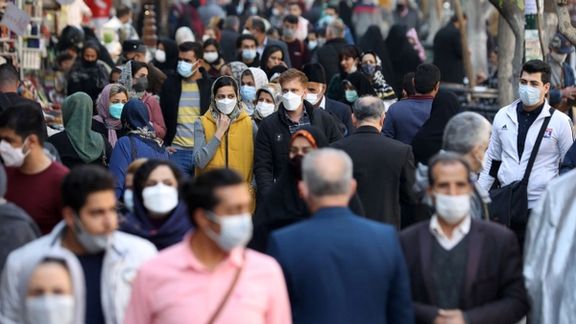
Politicians and the public are voicing concern over rising inflation in Iran while officials' promises to lower prices and tackle poverty prove to be hollow.
A deputy industry minister who promised on Wednesday to bring down prices overnight to their early March level was harshly mocked on social media, while some remembered President Ebrahim Raisi's promise in mid-March to end poverty within two weeks.
Hardline daily Jomhouri Eslami warned on Thursday that "Iran will be facing a difficult situation if wise decisions are not made to revive the 2015 nuclear deal" as a bid to lift the US sanctions that have paralyzed Iran's economy and made life difficult for ordinary people.
The daily further warned that delay in resuming talks currently suspended, is having damaging impact on Iran's economy. This comes while Iranian officials have been promising for months that negotiations are in their final stages and an economic breakthrough is on its way.
In the meantime, prices of essential commodities, cars, construction material, foodstuff and household goods have been constantly on the rise, particularly after the change of government in August 2021, the daily noted. “The situation is approaching a state of instability and there are concerns about an upcoming difficult situation if wise decisions are not made quickly."
On Wednesday, Amanghelich Shadmehr, an Iranian lawmaker from Gonbad Kavous criticized government officials for ignoring the economic problems and called on them to prevent an upcoming catastrophe, Aftab News website reported.

He said "Raisi's declared priority was solving the country's economic problems. Now the people's patience is running out. They are struggling to cope with the maximum pressure." Shadmehr added that "the economic burden on the people's shoulder are so heavy that that a new straw will break their back."
It is not clear if he intentionally used the phrase 'maximum pressure', which is how the former US administration labeled its sanctions on Iran.
The lawmaker further warned that people cannot tolerate any further taxe increases or unusual decisions to raise fuel prices. He suggested that the government should start fighting the dragon of corruption by preventing the activities of monopolies and dealers who contribute to inflation.
He said that many young Iranians have left the country looking for jobs abroad, adding that around 100,000 young men from the Golestan Province have left for other provinces and some of them have gone to Turkey to look for a job.
Meanwhile, an April 14 report on the conservative news website Tabnak pointed out the cost of housing for tenants has been climbing in an unusually fast tempo, warning that 8 million Iranians will be facing problems when they need to renew their rental contracts this summer.
Rents in Iran are usually renewed in the summer before the opening of schools in September.
The report added that the government has not been able to provide financial facilities for first-time home buyers and has also failed to set a limit for rent increases, which have take away a large parts of wage earners’ income.
This comes while the average rent in January showed a 50.9-percent rise compared to the same time in the previous winter.
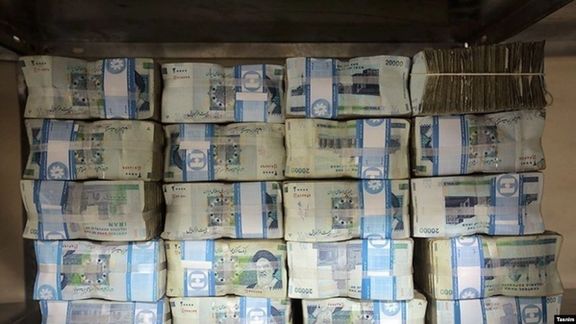
Iran will pay 1.5 million rials (less than $6) of cash handouts to 30 million citizens to help them during the Muslim fasting month of Ramadan as food prices keep rising.
The especial Ramadan handout that will be paid out Friday night is distinct from a monthly payment of less than $2 and covers about 60 million people.
The Ramadan handouts, which will total to about $180 million, suggest that authorities believe there are over 30 million people in the country who need the $6-cash handout.
The number of recipients and amount of the government’s handouts vary. For example, the cash handouts for the anniversary of the 1979 revolution was 1 million rials (less than $4) and was paid to 34 million people and the handout for the Iranian new year was 1.5 million rials (less than $6) but only 12 million Iranians received it.
The government is trying to increase the monthly cash handouts to $3-4 in the new Iranian year (from March 21) to compensate for the elimination of an $8 billion subsidy for food and medicine in its new budget.
A typical worker gets around $120 to $200 a month, while rents and other daily necessities have risen with the fall of the national currency, keeping pace with the value of the US dollar.
The current annual inflation rate hovers at around 40 percent.